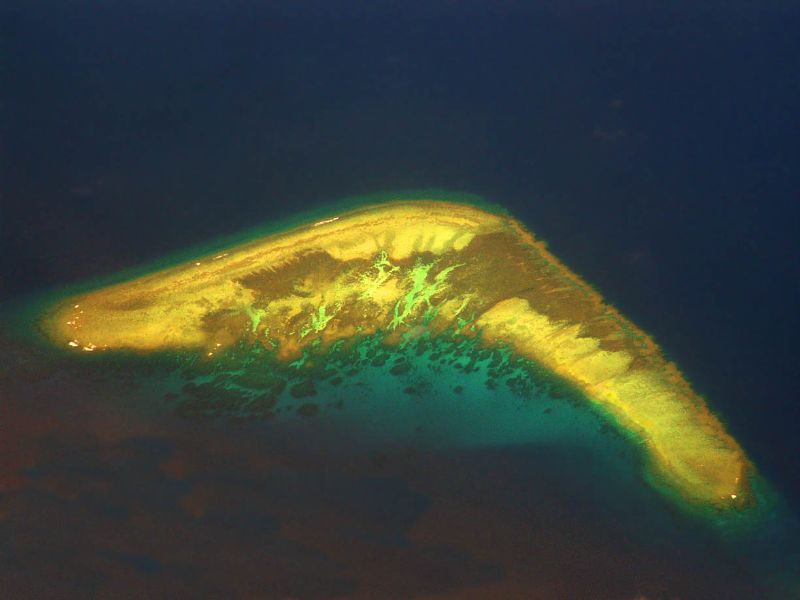China is in the lead in the South China Sea
 Taiwanese president Ma Ying-jeou’s recent visit to Taiwanese-held Taiping Island serves as the latest low-level antagonism further complicating the stability in the South China Sea. Longstanding territorial disputes between Brunei, China, Malaysia, the Philippines, Taiwan, and Vietnam, have been a key feature in the decades-long diplomatic stalemate. With the exception of Brunei, all claimant nations occupy some of islands, reefs, and other geographic features in the disputed Spratly archipelago.
Taiwanese president Ma Ying-jeou’s recent visit to Taiwanese-held Taiping Island serves as the latest low-level antagonism further complicating the stability in the South China Sea. Longstanding territorial disputes between Brunei, China, Malaysia, the Philippines, Taiwan, and Vietnam, have been a key feature in the decades-long diplomatic stalemate. With the exception of Brunei, all claimant nations occupy some of islands, reefs, and other geographic features in the disputed Spratly archipelago.
But all occupations are not equal.
Beijing’s exclusive maritime claims of the South China Sea continually fuels international uproar as many overlapping claims have yet to be resolved. No other claimant nation recognizes China’s assertion, further complicating the already fragile relationship many of these nations have with the rising superpower.
A Protracted Multilateral Disagreement
While Beijing postures a near total ownership of the South China Sea, it has yet to produce an official claim. A careful reading reveals that China, which refuses to pursue legal arbitration, subscribes to historical notions of Chinese boundaries in place of international customary law and adjudication. A practical occupation rather than a clear legal one serves as official PRC policy.
Beijing has yet to formalize a claim or clarify what exactly is under its sovereignty. In place of an explicit claim as it did with the Paracel Islands and the Diaoyu Islands, the government routinely refers to its nine-dash line or relies on international press coverage of an 80 percent claim. Artfully avoiding stipulating a legal position, China cultivates a widespread, steadfast rhetoric upholding its claim and thereby strengthens a customary narrative of its de facto ownership.
Slight progress has been made in terms of arbitration with the Philippines bringing its case with the Permanent Court of Arbitration (PCA) in The Hague. Though Beijing refuses to recognize PCA’s authority, the international tribunal not only decided to hear the case but also reaffirmed its jurisdiction in maritime disputes. Without considering the merits of the claims, an October 29, 2015 ruling unanimously found that it does in fact have jurisdiction and that China’s nonparticipation “does not deprive the Tribunal of Jurisdiction.”
China has stated it will not honor any ruled made by the PCA, in turn rendering any decision in this protracted dispute functionally meaningless. This refusal to engage in legal proceedings has thus further encouraged other claimants to continue antagonism and bolster their territorial claim.
Although not a claimant, U.S. activity within the region has risen in the past months. Invested in upholding the freedom of navigation, Washington has taken a tough stance in order to challenge not only Chinese territorial claims but also policies stipulating prior permission of notification before entering their territorial waters. Deploying numerous warships through these waters, U.S. Navy Destroyer USS Curtis Wilbur sailed through the region this past month, overshadowing the October 2015 Freedom of Navigation (FON) operation of U.S. Destroyer Lassen which drew an angry Chinese condemnation.
Game of Chicken: A Losing Strategy
While the ongoing dispute continues to linger in perpetuity, Beijing continues to pursue land reclamation, reiterating its “indisputable sovereignty over the Spratly Islands,” according to Chinese Foreign Ministry spokesman Lu Kang. These provocations have been unsuccessful in deterring this process. Undermining China’s maritime assertion has not accomplished any progress in preventing it from enlarging islands. Beijing is continuing its activities without pause. Satellite imaging has captured evidence of fleets of dredgers and tankers steadily enlarging and enhancing key geographical features.
FON operations and other forms of reassurance for the freedom of navigation do not constitute winning strategies on their own. They must be deployed in tandem with other tools in the diplomatic arsenal in order to dissuade China’s unilateral approach in the South China Sea. The U.S. and other claimant nations must pressure Beijing to state its legal position and participate in juridical processes address.
Beijing understands that the current state of affairs is self-beneficial and has twofold purposes. The other claimants have a limited ability to proceed diplomatically if there is no clarity on what specifically is being claimed. Additionally, the opacity gives China a moving target, preventing it from having to defend a hardline position and possibly losing face intentionally while giving it a wide degree of flexibility.
If the international community is unsuccessful in encouraging the Chinese state to choose the legal route, this game of chicken will soon resemble a game of battleship and there will be less options of recourse if China begins to populate, or perhaps militarize, the islands under its control.
Related posts:
Category: FOREIGN POLICY & SECURITY, INTERNATIONAL LAW & HUMAN RIGHTS, SOUTH ASIA & ASIA PACIFIC

